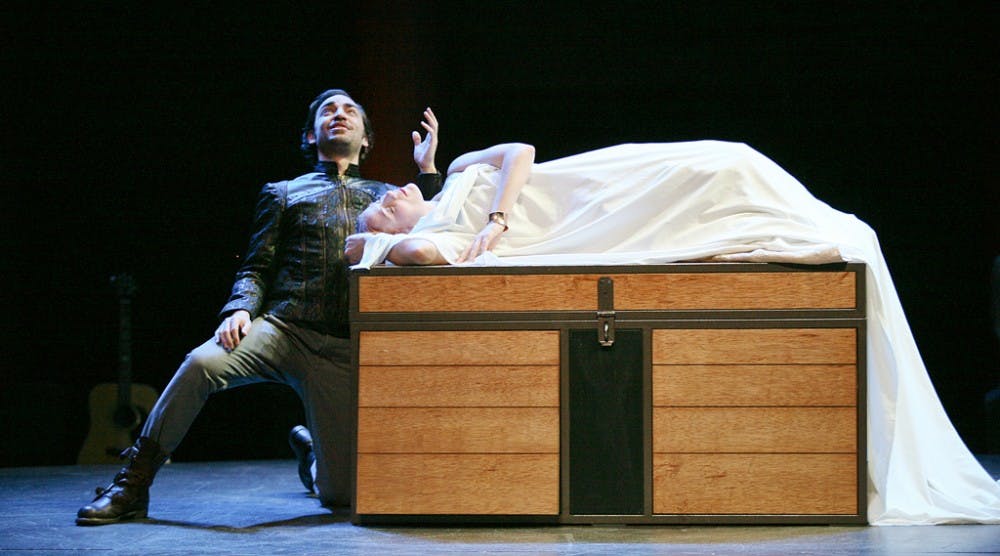After an 18-week run off-Broadway, Fiasco Theater Company will bring its critically acclaimed production of Cymbeline and its commitment to educating aspiring actors at Duke. Presented by Duke Performances and the Theater Studies department, the six-person Shakespeare company will be in residence from Feb. 2-18 to perform Cymbeline, visit classes and host a variety of conversations. The residency will culminate with open workshop readings for a new production of Measure for Measure.
Praised for its ability to keep Shakespeare’s plays fresh and playful through simple sets, creative use of props and instruments and dynamic fight scenes, Fiasco’s performance of Cymbeline offers Duke students the opportunity to see for themselves whether the hype about this young theater company is true.
Although there are countless ways to interpret and perform Shakespeare, Fiasco believes strongly in the primacy of the texts and in performing them the way Shakespeare intended, said Ben Steinfeld, a member of Fiasco Theater Company who co-directed Cymbeline. This means a set-less stage, big physical events, live music performed by the actors and, most importantly, direct engagement with the audience.
“We like to make the actors the center of the show and always invite the audience to meet us halfway with their imaginations,” Steinfeld said. “A lot of times in the theater nowadays, the lights are off on the audience and everyone does their best to pretend they can’t see or hear them. We’re not interested in that, because Shakespeare’s plays were performed in broad daylight. All the soliloquies, prologues, epilogues, songs, all this is meant to include and directly engage with the audience.”
Sarah Beckwith, professor of English and professor and chair of Theater Studies, recalls seeing Fiasco perform Twelfth Night in New York in the summer of 2010. Although Fiasco began to gain in popularity after the New York Times gave a positive review of its first production of Cymbeline in 2009, the company was still performing in a tiny theater, “way down on Broadway,” and had to turn off the air conditioning in order for the actors to be audible.
“They just gave this beautiful, magical version of Twelfth Night,” she said. “They’re a really young group to watch, so fresh, and they worked with the berth so well. There was nothing stuffy about their performance at all. It was as if they’d gone back to bare bones, worked with the words, and thought about it from the ground up.”
As a non-profit organization, Fiasco Theater Company is committed both to low-cost performances and to teaching inexpensive classes and workshops for aspiring actors. In fact, Fiasco’s readiness to have substantial interaction with students in the classroom and to spend time developing Measure for Measure on Duke’s campus are important reasons for sponsoring Fiasco’s extended residency, said Duke Performances director Aaron Greenwald. Due to the expense of extended theater residencies and the large number of events happening on Duke’s campus, Duke Performances only sponsors three or four extended residencies each year, he added.
“We would not bring a theater production here or a dance production here or a musician here if we did not think the quality was world-class,” Greenwald said. “We’re in the world-class business.”
In addition to being a crowd-pleaser for the general student body, Fiasco’s residency opportunities will allow for more in-depth study of Shakespeare in English and Theater Studies classes.
“I have found that really good actors absolutely inspire and energize the class because they’ve worked so responsibly and accountably with the texts,” Beckwith said. “They’re such brilliant readers and they think in such incredibly intelligent ways about the text, that when they come into an English class where students have been reading the text they literally bring it to life.”
The open rehearsals of Measure for Measure, to be held on Feb. 7 and 14, will be followed by question and answer sessions and allow students to observe how a group of actors “unpacks the texts” by doing acting exercises, practicing stage directions, and reading lines around a table, Steinfeld said. In addition to offering students a glimpse of how the group works together, the open-book readings on the 17 and 18 will be representative of the progress the company has made during their residency.
“This is such an important way that the university can be actively involved in sustaining the arts,” Beckwith said. “I can’t underestimate the importance of having this sort of work going on. It’s just a unique space for students to get involved in the process of making theater.”
Get The Chronicle straight to your inbox
Signup for our weekly newsletter. Cancel at any time.

